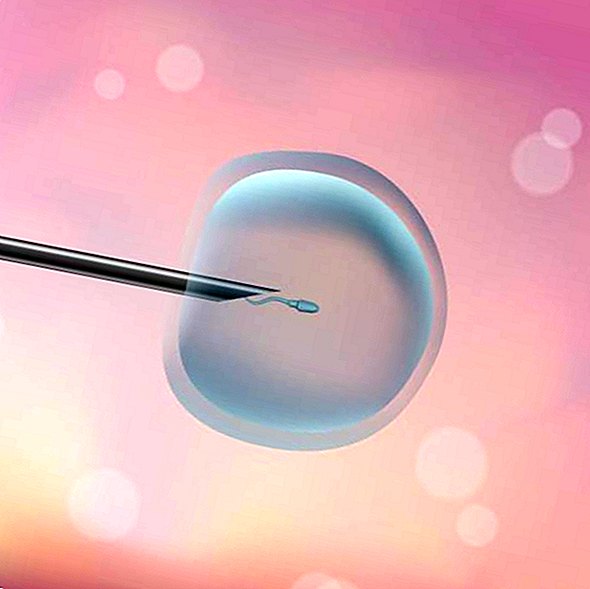ICSI: Opportunities and risks of fertility treatment

What is ICSI?
The abbreviation ICSI stands for "intracytoplasmic sperm injection" and is the most commonly used method artificial insemination. In the process, a single spermatozoon is injected directly into the cell interior (cytoplasm) of the previously extracted egg using a fine pipette. Fertilization is thus imitated artificially under the microscope. Does the fertilized egg then continue to develop, is it inserted into the uterus? in the hope that it will result in one embryo or multiple embryos.
This so-calledmicroinsemination It is used when there are insufficient fertile spermatozoa or the sperm are too lazy to penetrate into the egg cell on their own.
ICSI: How is the treatment going?
1st spermiogram
First, that will Sperm of the man under the magnifying glassto see how many sperm cells are present. Here is how to check moving the sperm are what shape they have and whether infections available. are too few sperm In the ejaculate, sperm can also be taken directly from the testicular tissue.
2. Ovulation and egg retrieval
In front of the ICSI is a hormonal stimulation of the ovaries (ovarian stimulation) necessary. For this purpose, different methods are used with different hormone preparations. Regular ultrasound examinations and blood tests are then used to check if and how many follicles have formed in the ovaries. Finally, if enough are available, the Ovulation triggered by a hormone injection. About two days later, about 10-12 oocytes under light general anesthesia with the help of an ultrasound probe and a thin needle through the vagina.
3. Fertilization
Become from the sperm won single sperm selected, which are injected under the microscope into an egg. Per ovum, one sperm.
Unfortunately, this does not mean that every fertilized egg cell evolves. Therefore, more oocytes are fertilized than used later.
4. Transfer
Did the fertilization work, betwo to three days later the resulting Transfer embryos to the uterus, The procedure is painless and therefore takes place without anesthesia. In most cases, two fertilized eggs are used per ISCI trial to increase the chance of pregnancy. After 14 days then hopefully the pregnancy test shows that it worked and you are pregnant.
What requirements must be met for an ICSI?
- The woman must be between 25 and 40 years, the man between 25 and 50 years old
- Both must be married or live together in a stable partnership (the statutory health insurance only pays part of the costs for married couples)
- In addition, both partners must have a negative HIV test
- An ICSI is usually performed when treatment with IVF was unsuccessful or it has already become clear from the preliminary examinations that the chances of having a child through in-vitro fertilization are low
- It is certified by a doctor that the treatment has sufficient chances of success
How big are the chances of success of an ICSI?
The success rate of having an ICSI to get pregnant, is 20 percent. For if the method is ultimately successful is one Interplay of many factors, In addition to the age of the woman, her health and physical fitness (weight, diet, medication, exercise, smoking and alcohol consumption) is especially the Quality of the germ cells decisive. For example, chromosomal abnormalities may be the reason why the fertilized egg simply does not divide, does not nest in the uterus and is rejected by the body.
What happens to the excess germ cells?
At the first treatment more oocytes are often taken than later fertilized. These eggs and sperm are with the respective consent frozen in liquid nitrogen, This has the advantage that no further hormone stimulation for another attempt necessary, which is particularly stressful for most women.
ICSI or IVF? What is the difference?
Both Procedures are very similar: hormonal stimulation, the removal of mature oocytes, and subsequent insertion of the embryos into the uterus are the same in both procedures. Only in the fertilization method differ IVF and ICSI. In the In vitro fertilization (IVF) brings male and female germ cells together in a Petri dish. However, the sperm must penetrate into the egg shell itself, thus creating it on its own power to fertilize the eggs.In the ICSI is helped here and the sperm injected by means of a syringe directly into the egg.
ICSI has now overtaken IVF in Germany and iThis is the method that is used far more frequently, Even women who have had no success with IVF can help ICSI to become pregnant.
For whom is ICSI suitable?
- For couples where the Man's fertility restricted is, for example, due to a closure of the spermatic ducts, the formation of the sperm itself is disturbed, sperm antibodies are in the seminal fluid, which make it difficult to procreation, or due to cancer, frozen sperm should be used
- The ICSI can also help if the root cause for the unfulfilled desire for children does not clarify (idiopathic sterility) or
- if both partners have one fertility problems respectively. Sometimes ICSI is a good method of artificial insemination in older couples.
Opportunities and risks of ICSI and IVF
- The intake of hormones to stimulate the ovaries can very stressful his.
- In rare cases, the stimulation of the ovaries leads to a so-called Hyperstimulation syndromein which the woman's body overreacts to the hormone preparations ?. Symptoms include abdominal pain, nausea, tummy tensions and shortness of breath. In this case, the doctor must be notified immediately.
- If several embryos are introduced into the uterus, this increases natural risk of multiple pregnancy (about 20 to 30 percent for IVF and ICSI) and one risk pregnancy.
- If it comes to an ICSI to a pregnancy, it usually goes normal, even if the risk ofmiscarriage is slightly increased.
- The mental stress Often underestimated by couples undergoing fertility treatment, it puts not only the body but also the relationship to the test.
- At the latest after the second or third failed attempt, it is time to over Alternatives to fertility medicine to speak. Also maintenance oradoption may be the way to a desired child.
- The average birthrate per treatment cycle is given for the ICSI with 15 to a maximum of 20%.
- The chances of having a child after ICSI treatment are very dependent on the couple's personal requirements.
- With some disturbances the Seed cell formation Also, the ICSI method has little or no chance of success.
- The Fertility of the woman is a crucial factor: some women do not produce egg cells despite hormonal stimulation, in others the eggs do not develop after fertilization or the embryo does not nest in the uterus after transmission.
- The Age of the womanplays an important role. The older the woman is, the lower the chance of getting a child through an ICSI.
How much does an ICSI cost and what does the health insurance pay?
- An ICSI treatment costs around 4000 euros per experiment.
- Were more eggs won than were used for the first try, costs for the storage (Cryopreservation) of the germ cells for future experiments. These amount to 300-500 euros.
The Statutory health insurance companies usually pay 50 percent of the costs, but for a maximum of three experiments and under special conditions. Some funds advertise with higher percentages, here should be weighed individually. Different is also the amount of private health insurance adopted sentence.
You want to get pregnant? We have some tips for you. Would you like to talk to other women about having children and artificial insemination? Then you are exactly right in our great ChroniquesDuVasteMonde Community.
Videotipp: Women with this name will become pregnant in 2019











